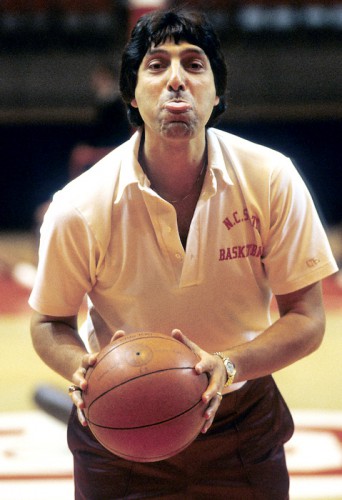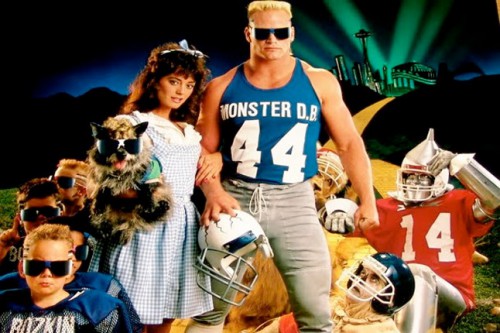
Another list from Issue 4, this one covers all that the sports world could not leave behind:
 It would seem that the reach of ESPN’s 30 for 30 project surprised even ESPN. One might have imagined that a selection of human-interest stories and documentaries from the nether regions of the sports world could have some cult potential for the multitude of fans out there, but people are almost always surprised to know that there are more than just 30 of these documentaries under the franchise’s belt. They are also not 30 minutes long, another misconception. No, the reason for the name 30 for 30 came from producer Bill Simmons (of Grantland fame), in the attempt to tell 30 stories from within the first 30 years of “the ESPN era” of sports (the series began in 2009), using different directors to tell these stories. That was what is now called “Volume I.”
It would seem that the reach of ESPN’s 30 for 30 project surprised even ESPN. One might have imagined that a selection of human-interest stories and documentaries from the nether regions of the sports world could have some cult potential for the multitude of fans out there, but people are almost always surprised to know that there are more than just 30 of these documentaries under the franchise’s belt. They are also not 30 minutes long, another misconception. No, the reason for the name 30 for 30 came from producer Bill Simmons (of Grantland fame), in the attempt to tell 30 stories from within the first 30 years of “the ESPN era” of sports (the series began in 2009), using different directors to tell these stories. That was what is now called “Volume I.”
The series has since grown to nearly 100 documentaries, including some online-only “shorts” and an entire imprint of “Soccer Stories,” all of which take a courtside look into the rich drama of life in sports. But, unlike SportsCenter or Monday Night Football, the stories gathered in the 30 for 30 collection are not the front-page stat-lines of victory margins and shooting percentages. In this series, instead, we find a glimpse into the beating hearts of human beings who also happened to be athletes—athletes with the same interior obstacles (and hopes) as the rest of us.
This one easily tops the list. It is the unlikely story of Jimmy Valvano, the Bronx-bred men’s basketball coach, and his ridiculous (and ridiculously persuasive) vision of an NCAA championship in 1983 with a down-and-out North Carolina State Wolfpack team, who had little hope for success in the postseason. Jimmy V was a class-act entertainer and, through present-day interviews with the men from that team of underdogs, he was also something of an adoptive father figure. If you want to know what the power of imputation looks and feels like, this film is all you need. It is also a beautiful depiction of Christian hope, of the paradoxical power of life in death. Without saying more, the ten-year reunion on the court is enough to move even Bobby Knight to tears.
Romans 7 writ large in the world of 1980s bleach-blonde mohawks, those huge football horse collar pads, and, yes, anabolic steroids. Brian Bosworth was the pre-eminent college linebacker of his day, a hard-hitting, soft-spoken recruit from Texas who grew up under heavy expectations from a demanding father. Harboring deep insecurities about himself and his potential, his demeanor changed in college when his coach (Barry Switzer) made him a leader on the field. His performance after just one season turned Bosworth into “the Boz,” a larger-than-life character that very quickly became more than just a high-dollar marketing opportunity. Before he knew it, Brian Bosworth was governed by a character he never wanted to be, a character who soon became the NFL’s favorite villain.
The opening statistic alone is shattering: “By the time they have been retired for two years, 78% of former NFL players have gone bankrupt or are under financial stress.” This documentary works like a modern-day camel-needle proverb, with a cast of characters whose lives (and lifestyles) had been simultaneously idolized and devastated. Directed by Billy Corben, this film opens up the lives of several professional athletes (Andre Rison, Cliff Floyd, Curt Schilling) who talk about not only the insane lifestyles they became accustomed to living, but the hoards of need that suddenly surrounded them from people who once loved them. A brutal depiction of a system that has used competition and showmanship (on and off the field) to destroy nearly everything around them. It all shows on Bernie Kosar’s shirt by the end of his interview.
Unguarded
 “I come here to tell you my nightmare.” The story of Chris Herren, a high school and college basketball phenom who, under the weight of small-town Massachusetts expectations, falls hard into the grips of addiction. After numerous second chances, Herren finds himself in the place he’d always dreamed of landing—married to his high school sweetheart, with a son, playing for the Boston Celtics. It was also during this time, though, that the man receiving all the accolades began to feel more and more like a lie. This one feels like a redemption story straight from the Big Book (or the Good Book), but it goes all the way to the bottom first. The unsung hero of Herren’s life, and the unmistakable Christ figure in the film, is his wife Heather. Keep the Kleenex box handy.
“I come here to tell you my nightmare.” The story of Chris Herren, a high school and college basketball phenom who, under the weight of small-town Massachusetts expectations, falls hard into the grips of addiction. After numerous second chances, Herren finds himself in the place he’d always dreamed of landing—married to his high school sweetheart, with a son, playing for the Boston Celtics. It was also during this time, though, that the man receiving all the accolades began to feel more and more like a lie. This one feels like a redemption story straight from the Big Book (or the Good Book), but it goes all the way to the bottom first. The unsung hero of Herren’s life, and the unmistakable Christ figure in the film, is his wife Heather. Keep the Kleenex box handy.
The story of one blue-chip quarterback, Todd Marinovich, the project son of another blue-chip quarterback, NFL veteran Marv Marinovich, and the toll it took on a career that could have been great. As one Sports Illustrated article of the day called him, “Robo-Quarterback” was the creation of a father’s ambition, an insane idol that backfired in the middle of a promising college career. As Howie Long, Todd’s former Raiders teammate, explains, “The pressure was on him from an early age, and I think that probably wore him down.” Understatement. Think Friday Night Lights’ JD McCoy, all grown up. It’s not all gloom and doom, though. There’s really an inspired change that takes place, but it only takes place with a mutual understanding between father and son: “I don’t want to be Todd Marinovich.”
More than Ali and Frasier, more than Venus and Serena, Chris Evert and Martina Navratilova’s rivalry in women’s tennis is larger and more historic than any other rivalry in individual sports. They played each other in 80 matches, 60 of which were finals, 14 of which were Grand Slam finals. And yet, despite this intense rivalry, they were (and are still) best friends. As Martina describes, the vicious realm of sports—of dividing winners and losers, of using all of one’s energy to defeat the person across the net—is an alienating experience: “We were never in the same emotional plane at the same time, yet going through the same thing, we were totally able to empathize with one another.” A beautiful story of friendship moving through and surpassing competition.
The story of Maurice Clarett is like a Greek tragedy. A running back with high moral ambitions and even higher physical ability, his arrival at Ohio State was like a favorite son staying home. When Clarett was in high school in Youngstown, Ohio, he was receiving more attention than another favorite son, his in-state contemporary LeBron James. Clarett’s stock rose as OSU won the national championship alongside new coach (and former Youngstown coach) Jim Tressel, who became the father Clarett never had. Things began to unravel quickly after, though, as Clarett became part of an NCAA investigation—a fated curve in the road that sent his entire future into a tailspin. One awful fall after another, you watch Maurice go to the bottom, where, somehow, he finds Coach Tressel again.
Hawaiian: The Legend of Eddie Aikau
There are almost too many Jesus parallels in Eddie Aikau’s life and personal history. There’s the near-Roman occupation of Hawaii, the heartbreaking transformation of the island into a state of “haoles” (pronounced HOW-lees), white people who took over the island and banished his native Hawaiians from their own beaches. And so it is the ocean where Hawaiians are still free—a no man’s land where power is available in excess. There’s also the symbolic “inheritance” of Aikau’s great-great grandfather’s beach, Haleiwa, as Eddie becomes the first ever lifeguard of it, never losing a life on his watch. In this role as lifeguard, Eddie himself becomes the destined servant surfer incarnate, the native son who stands in for the interlopers he should despise (even the Aussies!). His final duty goes straight to the cross.
[youtube=https://www.youtube.com/watch?v=8xcxT-A4WcQ&w=600]

COMMENTS
4 responses to “Eight Must-See 30 for 30s: A Magazine List”
Leave a Reply















AMAZING list.
I love ’30 For 30′. I watch at least one episode every weekend. It’s one of the things ESPN does the best.
I shed a few tears for Eddie Aikau, Chris Herren, and Jimmy V.. One could see the tears in the eyes of members of that NC State championship team, as they shared their memories of that special season. Not only did they lose their coach tragically; they lost their teammate Lorenzo Charles–who scored the winning points in the championship game. I remember reading about Charles’ death in a road accident.
And I love the last line about Eddie Aikau: ‘His final duty goes straight to the cross’. How very, very true.
The ‘Soccer Stories’ are excellent. The one on the Hillsborough stadium tragedy in England was about perseverance, on the part of the victims’ family members–and one academic, who joined them in pursuit of the truth about their loved ones’ deaths. And ‘The Two Escobars’: two Colombian men who shared the same surname, but whose lives went in opposite directions.
Great stuff.
Thanks for posting this list.
Also fascinating: “I Hate Christian Laettner.”